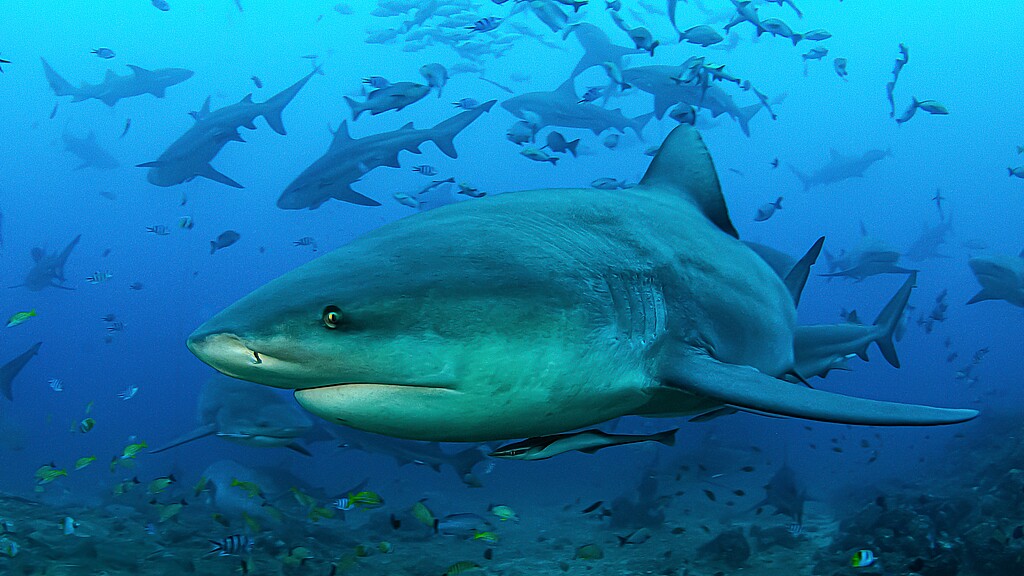Health
Cocaine sharks test positive off Brazilian coast, according to scientists who say the phenomenon could harm humans
Since shark is also considered a common food in Brazil, cocaine contamination could pose a health risk when passed along to humans

July 25, 2024 10:26am
Updated: July 25, 2024 2:49pm
Sharks swimming off the Brazil coastline have tested positive for cocaine, according to scientists, an elite team of marine biologists and environmental scientists who also say the phenomenon could be harmful to humans.
The team of researchers and scientists say the study involved 13 Brazilian sharp nose sharks that were located off the coastline of Rio de Janeiro. The sharks were purchased by the team from small fishing vessels that hunt that species and others, according to Science magazine.
After the scientists had a chance to dissect and study the 13 sharks in their laboratories, they specifically tested the liver and muscle tissue of the large fish by using a standard technique called liquid chromatography with tandem mass spectrometry.
The otherwise fierce fish were tested and found positive for high levels of the illegal narcotic, which could endanger their health.
Test results showed that the concentrations were an estimated 100 times higher than other aquatic creatures that were similarly tested, according to the Oswaldo Cruz Foundation, the organization that was the first to detect cocaine presence in sharks.
Experts offered various explanations, some of which involve the drug trade.
During the past few years more and more bales of cocaine have been detected and recovered in ocean waters by law enforcement after drug traffickers dump them at sea as part of transfers or to rid themselves of evidence.
On May 9, ADN America reported that a 65 pound bale of cocaine was found washed up on the beaches of the Florida Keys. U.S. Coast Guard authorities said the bale had an estimated street value of about a million dollars. Last year, ADN reported that sharks off the coast of Florida were ingesting cocaine following two reports that South Florida beachgoers found a total of $700,00 worth of the illegal drug on local beaches.
Human consumption of cocaine could also be making its way to the ocean and harming the fish.
Traces of cocaine are also making their way into ocean waters from drug labs where the illegal narcotic is being manufactured and even from the “excrement of drug users,” according to reports.
“Cocaine has been detected in sewage and rivers in many countries, including Brazil. Around Rio de Janeiro, the drug probably enters the sea directly in drainage from illegal labs where cocaine is refined. It also comes from drug users via untreated sewage. Cocaine packs lost or dumped by traffickers could also be a source,” according to Science magazine.
Sara Novais, a marine eco-toxicologist at the Marine and Environmental Sciences Centre of the Polytechnic University of Leiria, who was interviewed by the publication said the shark test results are “very important and potentially worrying.”
One of the most significant concerns for the sharks are how it may impact their ability to reproduce since all the female sharks in the study were pregnant. Novais said that the impact of cocaine on the unborn sharks is unknown at this time, but that it could be dangerous.
Another concern for the fish, the magazine said, is that “toxicants in the sharks’ livers can hinder production of vitellogenin, which becomes the yolk needed for egg cells. All females in the study were pregnant, although the consequences of cocaine exposure for the fetuses are unknown. Also still unclear is whether the drug affects shark behavior.”
Other researchers say the phenomenon is dangerous for the environment and people.
Anna Capaldo, an endocrinologist and expert in environmental pollution at the University of Naples Federico II told Science magazine that, “This is evidence of the increasing danger of cocaine pollution.”
Since shark is also considered a common food in Brazil, cocaine contamination could pose a health risk when passed along to humans.
Previous research has shown that drugs can sometimes have similar impacts on animals as they do on humans, according to a report published by the BBC.
“Last year, chemical compounds including benzoylecgonine, which is produced by the liver after cocaine use, were found in seawater samples collected off the south coast of England,” the British news agency reported.
While no one is currently certain whether cocaine alters the behavior of the sharks, the theme was exploited in a now famous eco-horror B film released in Japan called, “Cocaine Shark.”
The 2023 film chronicles the tale of a murderous mutant shark which is affected by a new drug called HT25, developed from sharks kept in a secret laboratory. When the lab explodes and the sharks escape, there are perilous consequences.
Earlier this year, a documentary film, “Cocaine Sharks” followed on the crazy from the Japan-released film and actually investigated the potential impacts that cocaine could be having on sharks in the Gulf of Mexico as a result of the drug packets and shipments being left in waters from smugglers.








